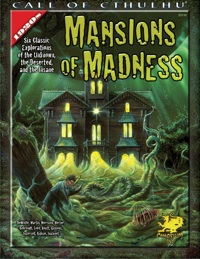
|
About OgreCave and its staff
|

|
by Demian Katz
First published in 1990, Mansions of Madness is a collection of 1920s-era Call of Cthulhu scenarios centering on a variety of dangerous homes, including a plantation and a sanitorium, along with several slightly more conventional buildings. This 2007 reissue includes the original five adventures from the 1990 printing and adds a lengthy new scenario as a bonus. While the new adventure may not be enough justification to repurchase this if you already have the original edition, all six adventures are of quite high quality, and this is definitely a worthwhile investment if you haven't already encountered it.
The Adventures Next up is "The Plantation", an action-oriented adventure for experienced investigators, in which a chance run-in with the child of Southern sharecroppers eventually leads to encounters with a voodoo cult and a disturbing number of snakes. There's a bit more combat here than you find in the usual Call of Cthulhu adventure, but that doesn't get in the way of a good amount of role-playing and exploration as well. Despite much of the action being set in South Carolina, this adventure could make a good complement to the recently released Secrets of New Orleans with minor adaptations. It also includes a fairly detailed appendix of game mechanics for dealing with snakes and snakebites that keepers should continue to find useful long after they finish the adventure itself. The third adventure, "The Crack'd and Crook'd Manse", deals with the search for a missing millionaire. It is the oldest story in the collection, dating back to 1984, when it was used in a slightly different form as a tournament adventure at an Australian game convention. It has aged well, and is particularly well suited as an introduction to the game. Clues and red herrings are liberally placed throughout the scenario, offering the keeper means of helping newbies who get stuck or delaying experienced players who get too close to the truth too quickly. Executed correctly, the adventure has a great slow build, growing from simple mystery to atmospheric horror tale to all-out fight for survival. It's hard to pick a favorite in this collection, but this would probably be mine. In "The Sanatorium", the investigators are invited to an exclusive island sanitorium run by a friend only to find that, quite literally, the inmates are running the asylum. In addition to an urgently need to learn the nature of the horrors afflicting the island, the players are likely to get involved in day-to-day management of the patients just to keep things from getting completely out of control. There's a lot of potential for role-playing with quirky characters here, and there's also the possibility of an interesting "game within a game" feel if the keeper emphasizes the need to balance running the sanitorium by day with battling horrors by night. This one could be a fair amount of work to run, but if done right, it's likely to be a memorable experience. The next adventure, "Mansion of Madness" is another missing person case, this time involving the investigators with the Boston art scene, a decidedly unusual gangster, and an old house in western Pennsylvania. Even though this adventure has some good elements, they didn't really fit together in an entirely satisfying way for me, making this the low point of the collection for me. However, that's not to say it's a total waste of time – the fact that the backstory isn't entirely well-realized doesn't reduce the creepiness of some of the events that occur in the scenario, and the players may not really care (or notice) if all the details fit together with perfect logic. If nothing else, I was happy to see my home state featured in a Call of Cthulhu scenario for once! The collection closes with "The Old Damned House", in which the investigation of a jewelry theft introduces the players to an old family with an old house and an old secret. In some ways, this scenario is like a cross between "The Crack'd and Crook'd Manse" and "The Sanatorium", mixing the investigation of a creepy home with interactions between a whole cast of eccentric characters. Although reasonably satisfying, the adventure isn't quite as good as these earlier two, mainly due to slightly haphazard organization and a rushed finale. You'll probably get a few good sessions out of this one, but it may take a bit of extra preparation to get all the information you need at your fingertips and lead the story to a satisfying conclusion.
Conclusions Fortunately, none of the flaws in this book detract too much from the overall quality of the adventures. Even the least satisfying scenario has some merits, and there should be something here to appeal to most styles of play. If you need ready-to-run Call of Cthulhu material, you could do a lot worse than to invest in this collection; you should get quite a few enjoyable horrifying nights in return.
|
||||
 Mansions of Madness (second edition)
Mansions of Madness (second edition)